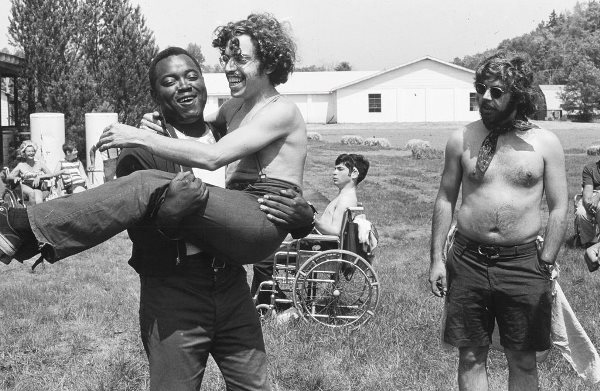

From the start, this inspiring documentary doesn’t want viewers feeling sorry for its subjects, all of whom have disabilities, including co-director Jim LeBrecht, who was born with spinal bifida, a condition that left him unable to walk. Yet home movies show him as a boy getting around astonishing well through the use of his other limbs. That, however, doesn’t stop his being discriminated against by those who have an irrational fear of his physicality.
But then something wonderful happens. In the summer of 1971, the then-teenage LeBrecht goes out to the Catskills to attend Camp Jened, where all of the campers have polio, cerebral palsy, or other disabilities. The idea behind the camp, which was run by socially conscious hippies, was to create an environment where the kids didn’t feel like the other, as was too often the case back home.
Thanks to archived footage shot by an alternative journalism collective, the People’s Video Theater, we see the kids become more confident and less self-conscious, to the point where during one remarkable group session, they start talking freely about their feelings and home lives. At the same time, this section of the film never loses sight that these teenagers have raging hormones. During one particularly ribald montage, campers confess to dating, sexual explorations, and a lice outbreak possibly related to sexual explorations.
Even more fascinating than the camp days is what they paved the way for. By the end of the 1970s, a number of former campers and counselors were political activists, including Judy Heumann, who was a founder of the civil rights organization Disabled in Action. Its members specialized in blocking off New York City traffic to draw attention to their plight. Others are doing similar work concurrently across the United States, but the film continuously connects the dots to pinpoint how many of those involved had been Camp Jened attendees.
There are also scenes focusing on a few subjects’ personal lives as they sweetly remember how just one summer of liberation had a profound effect on them—for example, New Yorker Denise Sherer Jacobson, who has cerebral palsy. The impression we get is that Camp Jened gave her the confidence to eventually own her sexuality despite society’s view of her as devoid of any.
Much of the second half is devoted to demonstrations in 1977 as President Jimmy Carter’s administration waffled over signing the Rehabilitation Act of 1973, which included provisions protecting the rights of the disabled, into law. This saga culminates in Heumann leading a longer-than-anticipated sit-in a San Francisco federal building. Through interview footage with those who were on hand, viewers come to understand just how difficult and potentially dangerous it was for the protestors—many of them paraplegics or quadriplegics—to engage in this occupation, as they normally needed assistance just to live.
This film would be compelling enough for its tales from the front lines of a civil rights battle, but it’s also a satisfying depiction of underdogs rising up. Heumann, who was already an outspoken crusader for inclusivity back at Camp Jened, shines. She maintains her composure in the face of certain politicians’ condescending attitudes and responds with steely confidence. Meanwhile, even in his brief appearances, Steve Hofmann, a performer who integrated his cerebral palsy into an edgy stage act, makes a strong impression.
Overall, Crip Camp is an upbeat look back at a history that is arguably still being written today. The filmmakers never get around to asking how its principals feel about the 2016 election of President Trump, who once publicly mocked a journalist with a disability; suffice it to say, the struggle continues.
















Leave A Comment